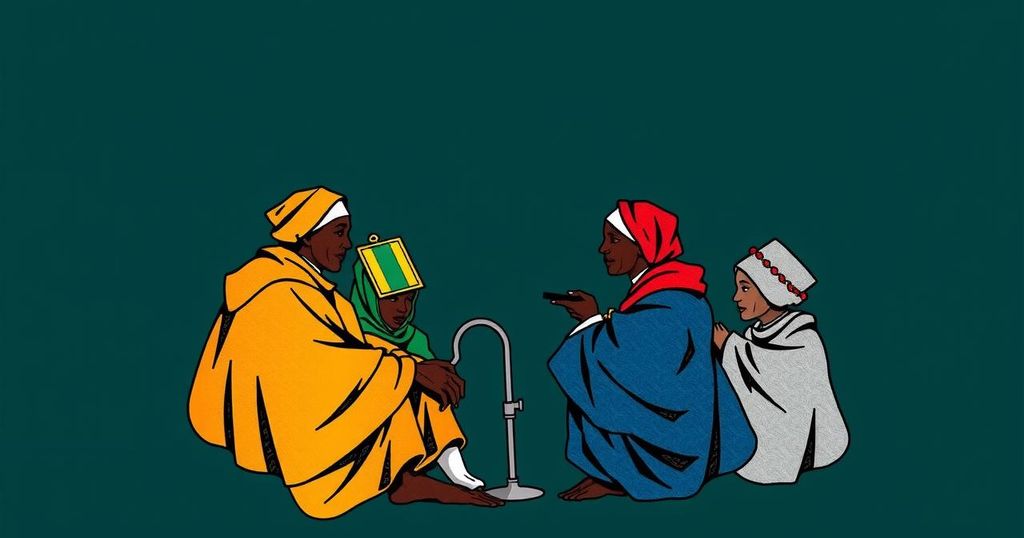Cardinal Stephen Ameyu Mulla of South Sudan advocates for synodality as a means to achieve peace in his country, emphasizing the necessity of collective dialogue among bishops and political leaders to address ongoing conflicts. Despite the Church’s growth, South Sudan continues to grapple with instability and a lack of effective governance. The cardinal’s reflections highlight the interrelation between faith and current crises, calling for renewed commitment to peace processes and service-oriented leadership.
At a Vatican press conference on October 18, Cardinal Stephen Ameyu Mulla of the Archdiocese of Juba, South Sudan, emphasized the importance of synodality as a pragmatic approach to achieving peace in South Sudan. He conveyed that the collective journey of the Church could assist in resolving various challenges faced by the nation, which gained independence in 2011 after a prolonged conflict with Sudan. “Synodality — going together — is for us the way to achieve peace [in South Sudan],” stated Cardinal Mulla. He communicated that the model of prayerful dialogue and reflection inherent in synodality could have far-reaching impacts both within the Church and in the broader sociopolitical context, potentially facilitating peace amidst ongoing tensions. Cardinal Mulla acknowledged the shared bishops’ conference of South Sudan and Sudan, highlighting the need for open dialogues among bishops to navigate the historical and ongoing conflicts between the two nations. He expressed concern over the increasing issues in South Sudan despite gaining independence, particularly the ineffectiveness in implementing the revitalized peace agreement established following prolonged leadership negotiations. Mulla referenced a meeting held at the Vatican between Pope Francis, South Sudan’s president, and opposition leaders, pointing out that significant progress has yet to materialize since that encounter. He reiterated the bishops’ insistence on the fulfillment of the peace agreement to bring stability to the country. The cardinal also spoke on the precarious situation in neighboring Sudan, which has faced civil unrest since April 2023, exacerbating regional instability and displacing countless individuals. “Our sisterly country… is bleeding,” he remarked, drawing attention to the humanitarian crisis stemming from the war in Sudan. Symbolizing the duality of faith and crisis, Cardinal Mulla noted that while the Church in South Sudan continues to grow—evident in the recent establishment of an eighth diocese—the nation itself is mired in challenges. He articulated the profound responsibility of leaders, emphasizing the need for service rather than mere authoritative control. “We’re suffering [because of] people who want power but not service… it is important to dialogue; without dialogue, we cannot settle things in the Church nor in the political arena,” he concluded. Cardinal Mulla’s call to synodality seeks to promote unity and constructive dialogue as pathways to resolve the profound social and political dilemmas within South Sudan and beyond.
The context of Cardinal Mulla’s remarks unfolds against the backdrop of South Sudan’s tumultuous history. The country achieved independence from Sudan in 2011 after enduring a prolonged civil war. However, South Sudan immediately fell victim to its own civil strife, which began in 2013 and persisted despite a tentative peace agreement brokered by the Vatican in 2020. The fragility of this peace remains apparent, with ongoing instability and inter-ethnic conflicts. Additionally, the situation in neighboring Sudan has deteriorated since April 2023, resulting in a significant refugee and humanitarian crisis that has further complicated South Sudan’s precarious position.
In conclusion, Cardinal Stephen Ameyu Mulla articulates a hopeful vision for peace in South Sudan through the lens of synodality, underscoring the necessity of collaboration and dialogue within the Church and between political leaders. His insights illuminate the urgent need for effective implementation of peace agreements and enhance the understanding of the broader humanitarian and political crises affecting both South Sudan and Sudan. The emphasis on service over power within leadership, alongside the commitment to a synodal approach, presents a path forward amid ongoing challenges.
Original Source: www.pillarcatholic.com







